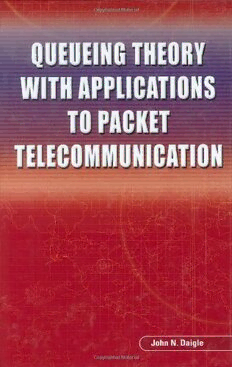Download Queueing Theory with Applications to Packet Telecommunication PDF Free - Full Version
Download Queueing Theory with Applications to Packet Telecommunication by John N. Daigle in PDF format completely FREE. No registration required, no payment needed. Get instant access to this valuable resource on PDFdrive.to!
About Queueing Theory with Applications to Packet Telecommunication
Queueing Theory with Applications to Packet Telecommunication is an efficient introduction to fundamental concepts and principles underlying the behavior of queueing systems and its application to the design of packet-oriented electrical communication systems. In addition to techniques and approaches found in earlier works, the author presents a thoroughly modern computational approach based on Schur decomposition. This approach facilitates solution of broad classes of problems wherein a number of practical modeling issues may be explored. Key features of communication systems, such as correlation in packet arrival processes at IP switches and variability in service rates due to fading wireless links are introduced. Numerous exercises embedded within the text and problems at the end of certain chapters that integrate lessons learned across multiple sections are also included. In all cases, including systems having priority, developments lead to procedures or formulae that yield numerical results from which sensitivity of queueing behavior to parameter variation can be explored.В In several cases multiple approaches to computing distributions are presented.В В В Queueing Theory with Applications to Packet Telecommunication is intended both for self studyВ and for use as a primaryВ text in graduate courses in queueing theory in electrical engineering, computer science, operations research, and mathematics.В ProfessionalsВ willВ also find this work invaluable because the author discusses applications such as statistical multiplexing, IP switch design, and wireless communication systems.В In addition, numerous modeling issues, such as the suitability of Erlang-k and Pade approximations are addressed.
Detailed Information
| Author: | John N. Daigle |
|---|---|
| Publication Year: | 2005 |
| ISBN: | 387228578 |
| Pages: | 326 |
| Language: | English |
| File Size: | 8.357 |
| Format: | |
| Price: | FREE |
Safe & Secure Download - No registration required
Why Choose PDFdrive for Your Free Queueing Theory with Applications to Packet Telecommunication Download?
- 100% Free: No hidden fees or subscriptions required for one book every day.
- No Registration: Immediate access is available without creating accounts for one book every day.
- Safe and Secure: Clean downloads without malware or viruses
- Multiple Formats: PDF, MOBI, Mpub,... optimized for all devices
- Educational Resource: Supporting knowledge sharing and learning
Frequently Asked Questions
Is it really free to download Queueing Theory with Applications to Packet Telecommunication PDF?
Yes, on https://PDFdrive.to you can download Queueing Theory with Applications to Packet Telecommunication by John N. Daigle completely free. We don't require any payment, subscription, or registration to access this PDF file. For 3 books every day.
How can I read Queueing Theory with Applications to Packet Telecommunication on my mobile device?
After downloading Queueing Theory with Applications to Packet Telecommunication PDF, you can open it with any PDF reader app on your phone or tablet. We recommend using Adobe Acrobat Reader, Apple Books, or Google Play Books for the best reading experience.
Is this the full version of Queueing Theory with Applications to Packet Telecommunication?
Yes, this is the complete PDF version of Queueing Theory with Applications to Packet Telecommunication by John N. Daigle. You will be able to read the entire content as in the printed version without missing any pages.
Is it legal to download Queueing Theory with Applications to Packet Telecommunication PDF for free?
https://PDFdrive.to provides links to free educational resources available online. We do not store any files on our servers. Please be aware of copyright laws in your country before downloading.
The materials shared are intended for research, educational, and personal use in accordance with fair use principles.

